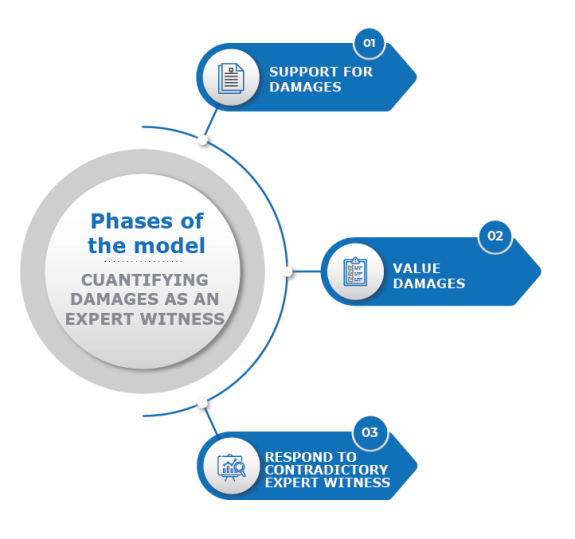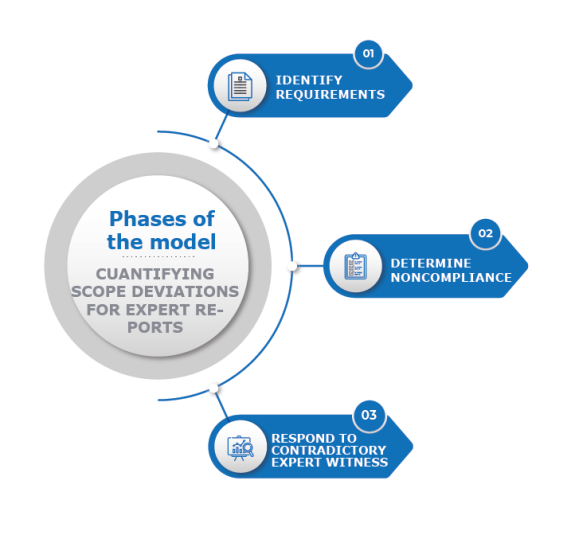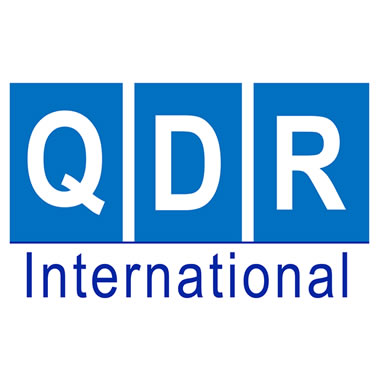Claims & Experts Witness

Set of rules to define and apply internationally recognized methodologies, techniques and tools to the Claims/Expertise Witness processes (according to QDR, the Claims and Expertise Witness processes only differ in the response to the counterpart report expert opinion): understand and validate the assignment, know, understand the contract and its deviations, define and apply the pertinent mechanisms, evaluate the disputed situation, provide a technical analysis, determine consequences and issue an Expert Report that helps the decision makers/court understand the issue and issue a resolution.
The Phases of the QDR Model for Quantifying Damages in Cost and Time as an Expert Witness represents an integrated process to “Evaluate Support for Damages,” “Value Damages” and “Respond to Contradictory Expert Witness Opinions,” where necessary at each stage of the arbitration process. We evaluate excusability, compensability, causality, and the mechanisms used in the valuation of damages.
QDR has proven experience in applying mature techniques and methodologies in quantifying and valuing matters that impact costs and time under a wide variety of form contracts and custom contracts

- Quantify Time Damages
QDR’s Schedule Delays experts have vast knowledge and experience in Planning and developing Forensic Schedule Analysis (schedule analysis plus delay analysis) on projects and contracts for the engineering/construction industry. Includes preparation, review, and analysis of the following types of schedules and delay analysis:
üSchedule Management Plan
üSchedule Baseline
üDetermination of the Critical Path
üPeriodic Updates to the Schedule
üResources and Costs Charged to the Schedule
üForensic Analysis of Schedule
üTime Extension Analysis
üAcceleration Analysis
üTime Impact Analysis
üAnalysis of Concurrent Delay
üCalculation of time damages
- Quantify Damages Costs
QDR’s experts in Additional Cost Damage Recovery have extensive experience in estimating costs of engineering/construction projects and contracts and in evaluating and quantifying damages associated with Claims. They combine its experience and knowledge to provide an integrated approach to the analysis of Claims/Experts Witness. It not only seeks to identify the technical issues that caused man-hours and cost growth in the Contractor’s cost reports, but also to ensure that the costs represented in the cost reports are traceable and contemporaneous. Includes the preparation, review, and analysis of the following types of budgets, estimates, and analyses:
üOffer Estimates (Lump Sum, Unit Price)
üAnalysis of errors in the Offer
üCost Variation Analysis
üChange Order Assessments and Pricing
üLabor and Material Cost Assessments
üLost Labor Productivity Analysis: Measured Mile
üAnalysis of Disruption
üCause Effect Analysis
üCosts for additional time
üCentral Office Overruns
üDamage Costs
- Quantify Scope Deviations
The Phases of the QDR Model for Quantification of Scope Deviations for Expert Reports answer the next questions:
a) Was the type of work within what was contemplated by the parties when they signed the contract? and
b) Was the finished product substantially the same as the product initially envisioned?
QDR has proven experience in performing scope deviation analysis and integrating specialized technical opinions where necessary to provide complete answers to these questions

üIdentify requirements: divide the Contract into elements and identify high-level requirements, previously established in the Contract.
üDetermine Non-Compliance: identify gaps between the Contract specifications and the functionality of the built.
üDefine Scope Deviations Quantification Mechanisms: Define which techniques, tools, and/or methodologies will be used to quantify Scope Deviations.
üExistence of traceable and contemporary records.
The QDR model to Quantify Deviations in the Technical Scope of construction and functionality of works to expertise, includes the previous premises and captures them as the sum of the processes “Identify Requirements”, “Determine Non-Compliance” and “Absolve Contradictory Expertise”: they seek determine the relevance and achievement of the previously established objectives of the contract -regardless of the type, model or modality-, evaluating the variations between the scope of the technical specifications and the execution of said works, for the impartial and reasonable determination of those Scope Deviations and review the methodological coherence to respond to the Contradictory Expert Report, according to the following schematic process:
- Quantify Deviations from Engineering, Construction and Commissioning
QDR’s Engineering, Construction and Commissioning Experts have extensive knowledge and experience in the design and construction of engineering/construction projects and contracts, particularly industrial and process plant projects and contracts, so they can assess contractor performance, engineering deliverables, and construction practices against safety standards.
During contract development, QDR evaluates the Contractor’s entitlement in its change order requests to determine if the requested change is in fact a scope change, or part of the original contract requirements. These analyses are essential to determine the Contractor’s Right to Claims for large delays and disruptions. Our technical analysis experience in Engineering, Construction and Commissioning includes the following types of reviews, analyzes and evaluations:
üReviews of Engineering Specifications, Construction and Commissioning
üTechnical Evaluations of Change Orders
üConstruction Methodology
üAmbiguity of contractual requirements
üAnalysis of the language of Contracts to identify exempting/exculpatory clauses and Risks
üProcess Engineering Analysis
üProcess Commissioning Analysis
üEquipment Specifications
üEvaluations of the Earrings, punch list
üNon-conformance reports
üPerformance problems caused by the Contractor
üOver Inspectio
üDifferent site conditions
üProcess Flow Diagrams
üSecurity issues
HeadQuarters
1007 N. Orange St. 4th Floor
Wilmington, DE 19801
+1 267 679 6065
contacto@qdrclaims.com
Copyright © 2015 Asesorías, Consultorías y Servicios QDRclaims SpA. The information contained in this site is the property of QDRclaims, and its reproduction will be allowed whenever the source is cited.
